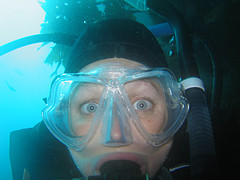 Self Contained Underwater Breathing Apparatus, that’s what SCUBA stands for, and SCUBA divers travel the world over to find the best dive sites. So, what do these particular travelers worry about most when insuring on their trips?
Self Contained Underwater Breathing Apparatus, that’s what SCUBA stands for, and SCUBA divers travel the world over to find the best dive sites. So, what do these particular travelers worry about most when insuring on their trips?
- What if bad weather wipes out my dive trip?
- What if my checked equipment doesn’t arrive when I do?
- What if the dive operator goes bankrupt?
- What if I’m injured or get decompression sickness and need medical care?
Bad weather
Let’s say you’ve scheduled a dive trip to Turks & Caicos during hurricane season. After a hurricane strikes, you may find the dive resort is technically livable but the facilities may not be very functional or fun. You may not even have a dive boat if that’s been sunk or destroyed.
The key to trip cancellation and trip interruption coverage when it comes to hurricanes is that the destination must be uninhabitable for benefits to be available.
Your best bet? Protect yourself with ‘cancel for any reason’ coverage and you’ll get at least some of your non refundable trip costs back.
Missing luggage
Ah, so you thought you were smart and carried on your suitcase but checked that huge bag of SCUBA gear. Well, you were smart. You saved some dollars on checked luggage fees, but if your gear bag goes missing, what can you do?
Some travel insurance plans have sports equipment coverage that provides extra cash when your sporting equipment is lost or delayed. With a call to your travel insurance provider, you can rent or purchase replacement equipment and hope yours turns up eventually.
Bankruptcy or financial default
So, even if all goes well as you travel to your destination, you cannot guarantee it will all be well when you arrive. What happens if the dive operator to whom you sent non refundable payments to turns out to have closed their doors due to bankruptcy or default?
Banging on their shuttered windows and locked doors won’t get your money back, but some travel insurance plans include financial default in their coverage. So, if you happen to give all your diving dollars to some bankrupt shark, you can at least get a refund from your travel insurance company and hopefully find a replacement dive operator.
Medical care
Now this one is slightly trickier because travel insurance companies like to limit their risk by isolating dangerous activities and limiting those from coverage. That means that most travel insurance plans specifically exclude activities like SCUBA diving unless you follow some rules:
- You must already be PADI or NAUI certified.
- You have to be diving with a certified dive instructor.
- Often, you have to stay above 130 feet (which, if you’re a diver, makes sense).
All those rules being met, many travel insurance plans still require you to purchase an optional sports rider for coverage to be available. That being said, if you do all those things and you are injured or become ill on your trip, then your travel medical coverage will kick in to the plan limits.
During the trip
Any time you encounter a travel problem that may be covered under your policy, it’s important to contact the travel insurance company as soon as possible. They’re your backup team and they’ll let you know what’s covered and what you can do about the problem you’ve encountered.
